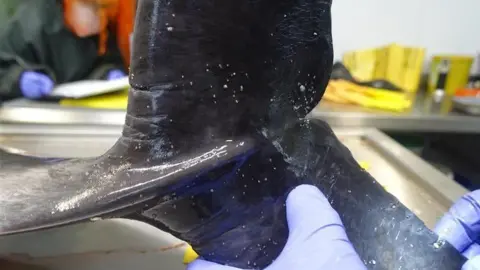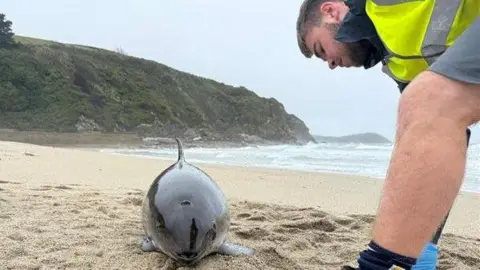Change urged after pregnant porpoise dies in nets
 Cornwall Wildlife Trust
Cornwall Wildlife TrustA pregnant porpoise found stranded in Cornwall died after being caught up in commercial fishing nets, a post-mortem examination has found.
James Barnett, veterinary investigator for Cornwall Marine Pathology Team, described the examination as the "most distressing he has ever seen".
"In nearly 20 years of undertaking this work, I have rarely seen a female so close to term. It was quite emotional for all of us," said Mr Barnett.
Campaigners called on the government to provide access to acoustic deterrent devices, known as "pingers", which emit sounds to alert porpoises to fishing nets. The Marine Management Organisation (MMO) said vessels over 12m (39ft) were required to use acoustic devices.
 Cornwall Wildlife Trust
Cornwall Wildlife TrustThe porpoise was found by trust volunteers on Good Friday after they were called to Pentewan Beach near St Austell.
A post-mortem found the animal had been heavily pregnant with a near-term calf.
Mr Barnett said the porpoise displayed "clear signs of entanglement" in monofilament fishing net, also known as gillnets – "a strong indicator of bycatch".
Bycatch describes marine creatures trapped by commercial fishing nets during fishing for a different species.
The post-mortem was carried out as part of the government-funded Cetacean Strandings Investigation Programme.

Cornwall Wildlife Trust said increased sightings of small cetaceans, which are marine mammals including dolphins and porpoises, over the last nine years had coincided with more interactions with fishing activities.
Bycatch was estimated to kill more than 1,000 harbour porpoises every year in UK waters alone, it said.
Rebecca Allen, marine conservation officer at the trust, said: "It's an agonising death for the individuals, and this level of loss is not sustainable for these populations.
"Urgent" government action was needed to work with fishers, many of whom were "ready" to use the devices, she said.
However, the trust said fishers had reported difficulties obtaining licences to use the deterrent devices.
A spokesman from the MMO said vessels over 12m (39ft) were required to use acoustic devices, and those outside that requirement must obtain a marine wildlife licence.
With regard to fishers' difficulties obtaining licences, it said many applications came to the department anonymously without the required details, so they were unable to process them.
It said bycatch of porpoise was a concern and new management measures were being explored.
'Campaigned endlessly'
Nick West, chairman of the Mevagissey Fisherman's Association, said a trial of the pingers had proven "undeniably effective", with no bycatch recorded on cameras installed on vessels using them daily.
Mr West added said they had "campaigned endlessly" for the devices, which they had offered to fund.
The MMO said options to manage bycatch could include expanding the use of the acoustic deterrent devices, spatial closures or voluntary options, but no decisions had been made.
It said it was discussing the options with experts and planned to involve industry leaders later this year to develop a formal proposal for consultation.
Follow BBC Cornwall on X, Facebook and Instagram. Send your story ideas to [email protected].
